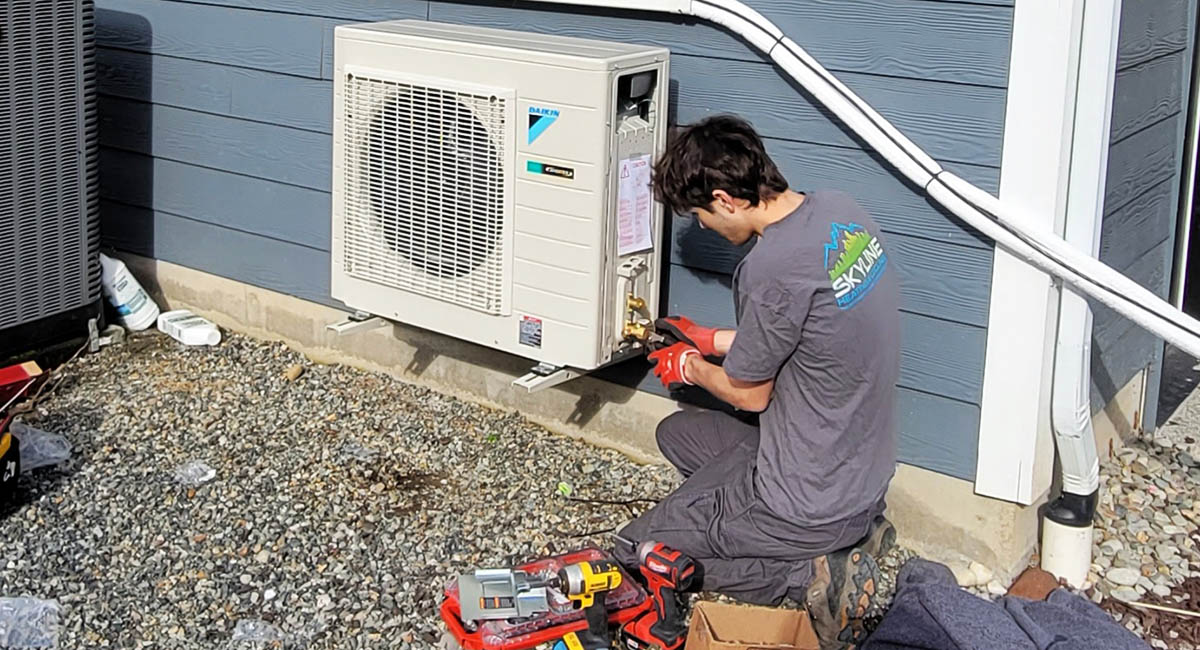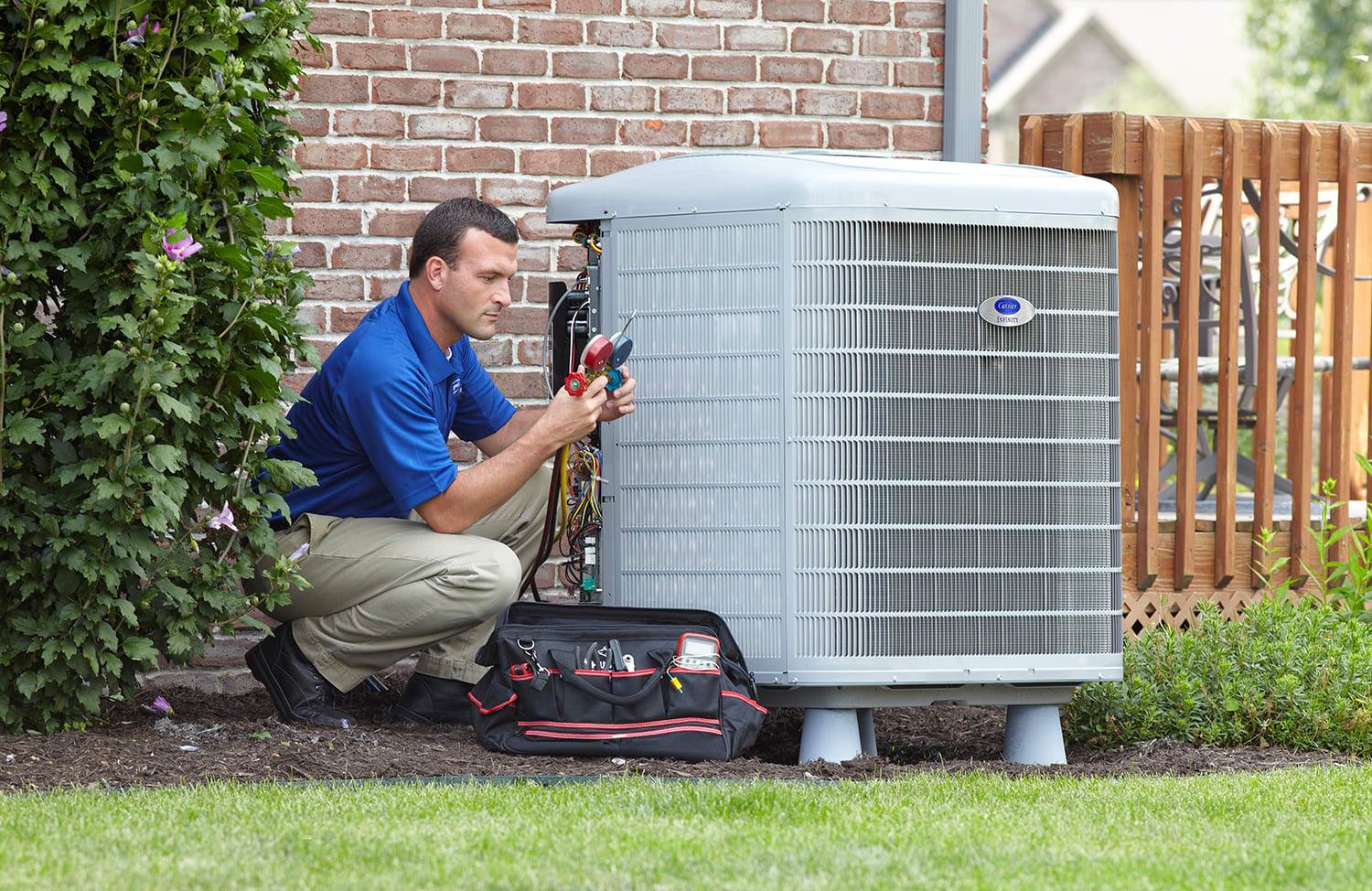Heat pump maintenance is essential for efficiency and longevity. Regular check-ups prevent system failures and save on energy costs.
Maintaining your heat pump is crucial to ensure it operates at peak performance year-round. This task, often overlooked, involves routine cleaning, filter changes, and inspections to avoid costly repairs and extend the unit’s life. Proper maintenance keeps your heat pump running smoothly, minimizes energy consumption, and maintains indoor comfort.
It’s recommended to schedule professional heat pump maintenance at least once a year, ideally before the heating or cooling season begins. Between professional visits, homeowners should keep the area around the heat pump clear of debris and check for any unusual noises or decreases in performance. Adhering to a maintenance schedule not only protects your investment but also contributes to a more sustainable and energy-efficient home.
Table of Contents
Importance Of Heat Pump Maintenance
Maintaining your heat pump is key to a comfortable home. Think of it like a superhero for your house. It keeps you warm in winter and cool in summer. But even superheroes need a little care to keep them at their best. Let’s dive into why keeping your heat pump in shape is a big deal.
Efficiency And Performance
Regular maintenance helps your heat pump work better. Just like a bike runs smoothly with oiled gears, a heat pump needs check-ups. It’s all about keeping your home comfy with less energy. Here’s what a well-maintained heat pump means for you:
- Better air flow – Air moves freely through clean filters and ducts.
- Consistent temperatures – No more random cold spots at home.
- Longer lifespan – Think of it as your heat pump living its best life.
Cost Savings
Saving money is always smart. With a tuned-up heat pump, you spend less cash on energy bills. It’s like a piggy bank that keeps on giving. Check out how maintenance puts money back in your pocket:
| Maintenance Task | Money Saving Benefit |
|---|---|
| Cleaning or replacing filters | Less strain on the system, lower energy use |
| Checking refrigerant levels | Prevents costly leaks and efficiency drops |
| Inspecting ductwork and seals | Avoids air leaks, saving heating/cooling costs |
Remember, a little care goes a long way. Keep your heat pump happy, and your wallet will thank you!
Signs That Maintenance Is Needed
Heat pumps are vital for comfort in many homes, working year-round to heat and cool spaces. Like any machine, they require regular checkups to run efficiently. Knowing when your heat pump needs maintenance can save you from costly repairs and ensure your home stays comfortable. Look out for these signs that suggest your system needs a professional’s touch.
Reduced Heating Or Cooling
If your home isn’t as warm or as cool as it should be, it’s a clear sign something’s not right. A heat pump struggling to maintain the desired temperature means it’s time for a checkup. Don’t ignore these changes in performance; they can indicate issues like low refrigerant levels or clogged filters.
Strange Noises
Unusual sounds coming from your heat pump are a red flag. Listen for clicking, grinding, or whistling noises. These sounds can signal that internal parts are worn out or damaged. Early detection of these noises can prevent more serious problems with your heat pump.
Increased Energy Bills
An unexpected rise in your energy bills often points to a decrease in your heat pump’s efficiency. Several factors can cause this, including dirty coils or a malfunctioning thermostat. Regular maintenance can keep your energy costs down and your heat pump working well.
| Sign | Possible Cause | Action |
|---|---|---|
| Temperature Inconsistency | Low refrigerant, dirty filters | Schedule maintenance |
| Noises | Worn out parts | Call a technician |
| High Energy Bills | Reduced efficiency | Inspect the system |
- Check filters monthly – Replace or clean as needed.
- Listen for odd sounds – Note any changes and alert a technician.
- Monitor energy bills – Look for unexplained increases.
Maintain your heat pump regularly to ensure peak performance. Address these signs promptly to enjoy a comfortable and efficient home.
Diy Maintenance Tips for Heat pump maintenance
DIY Maintenance Tips for heat pumps keep your system efficient and long-lasting. Simple steps can save money and prevent breakdowns. Here’s how you can maintain your heat pump yourself.
Regular Filter Changes
Changing filters is key for clean air and efficient system operation. Dirty filters make your heat pump work harder, which can lead to higher energy bills and early system failure.
- Check filters monthly and change them if they look dirty.
- Always use the right size and type of filter recommended by the manufacturer.
Cleaning The Outdoor Unit
Outdoor units are exposed to weather and can gather debris, which impedes performance.
- Turn off power to the unit for safety.
- Remove leaves, twigs, and dirt from around the unit.
- Use a gentle stream from a garden hose to clean the fins. Do not use a pressure washer; it can damage the fins.
Checking Thermostat Settings
Correct thermostat settings ensure optimal performance and comfort.
| Season | Recommended Setting |
|---|---|
| Winter | 68°F |
| Summer | 78°F |
Always ensure your thermostat is on the right setting for the season. This simple check can save energy and reduce costs.

Credit: skylineheatingandcooling.com
Professional Maintenance Services of Heat pump maintenance
Regular heat pump servicing is the key to ensuring your system runs efficiently. A professional service team can keep your heat pump in top shape, saving you from unexpected breakdowns and costly repairs. Let’s explore the essential maintenance services your heat pump needs to perform at its best.
Annual Inspections
An annual inspection is a crucial part of any thermo pump maintenance routine. A professional technician will thoroughly examine your system, looking for any potential issues. This includes checking filters, ducts, and electrical connections.
- Verify system operation
- Inspect electrical components
- Ensure proper airflow
System Tune-ups
System tune-ups boost your heat pump’s performance. During a tune-up, technicians calibrate your system to ensure it’s running as efficiently as possible. This process includes cleaning coils and checking all moving parts.
| Service | Details |
|---|---|
| Cleaning | Coils, filters, and blowers |
| Lubrication | Moving parts to reduce friction |
| Calibration | Thermostat settings for optimal efficiency |
Refrigerant Checks
The right refrigerant level is vital for your heat pump to function properly. During refrigerant checks, technicians ensure your system has the correct amount of refrigerant. They will look for leaks and recharge the system if necessary.
- Measure refrigerant levels
- Inspect for leaks
- Recharge refrigerant, if required
Heat pump maintenance cost can vary, but investing in professional services ensures your system operates efficiently year-round. Follow a comprehensive heat pump service checklist to avoid missing crucial maintenance steps. Remember, an air source heat pump service by a certified technician is the best way to extend the life of your heat pump.
Common Heat pump maintenance Problems
Heat pumps are reliable systems, but they can have issues. Regular maintenance helps avoid these problems. Let’s explore some common ones you might encounter.
Refrigerant Leaks
Heat pumps need the right refrigerant level to work properly. Leaks can cause efficiency drops and higher energy bills. Signs of a refrigerant leak include:
- Hissing noises from the unit
- Ice on compressor
- Warm air blowing from vents in cooling mode
- Need for frequent top-ups
A certified technician should handle refrigerant issues due to the chemical’s hazardous nature.
Frozen Coils
A heat pump’s coils can freeze due to poor airflow or low refrigerant. This stops the system from transferring heat effectively.
| Signs of Frozen Coils | What to Do |
|---|---|
| Frost on outdoor unit | Change filters, check for blockages |
| System struggles to heat | Call a professional |
Faulty Compressor
The compressor is the heart of a heat pump. If it fails, the whole system suffers. Symptoms of a faulty compressor include:
- Tripped circuit breakers
- Heat pump stops working
- Strange noises during operation
This issue requires immediate attention from a professional.

Credit: www.carrier.com
Benefits Of Regular Heat pump maintenance
Maintaining your heat pump is key to a cozy home. It saves money, energy, and worries. Let’s explore how regular care keeps your heat pump happy.
Extended Lifespan
Heat pumps last longer with regular checks. Just like your car, they need tune-ups. This stops small issues from becoming big, expensive ones. A well-maintained heat pump can serve you for up to 15 years or more.
Improved Air Quality
Fresh air in your home is a must. Heat pumps circulate air all day. They can spread dust and allergens if not cleaned. Regular maintenance includes cleaning or changing filters. This means cleaner air for you and your family.
| Maintenance Task | Benefit |
|---|---|
| Cleaning filters | Better air quality |
| Checking refrigerant levels | Efficient cooling and heating |
| Inspecting ducts, blower, and indoor coil | Prevents airflow problems |
Remember, an ounce of prevention is worth a pound of cure. Don’t wait for a breakdown. Keep your heat pump in top shape with regular maintenance.
Cost Of Maintenance Vs. Repairs
Heat pumps need regular check-ups to work well. Think of it like this: Taking care of your heat pump costs less than fixing big problems. Little fixes and cleaning keep your heat pump happy. Waiting for it to break can cost a lot more. Let’s look at the numbers for maintenance and repairs.
Preventive Maintenance Costs
Keeping your heat pump in shape doesn’t cost much. Once or twice a year, a pro should check it. This can cost between $150 to $300. The check-up includes:
- Cleaning filters and coils
- Checking the thermostat
- Making sure the system starts and stops right
Regular care can stop big problems. It also keeps your heat pump running smooth. This saves you money on power bills too.
Repair Costs
If your heat pump breaks, it can be pricey. Small fixes might be $150. But if you need new parts, it can be $1000 or more. Here’s what can go wrong:
| Problem | Cost |
|---|---|
| Broken thermostat | $150-$400 |
| Faulty compressor | $1000-$2500 |
| Refrigerant leak | $200-$1500 |
A broken heat pump can make your home too hot or cold. It can also raise your energy use. Fixing problems fast is key. It stops bigger issues and keeps costs lower.
Credit: www.townsendtotalenergy.com
Frequently Asked Questions on Heat pump maintenance
What Maintenance Is Required For A Heat Pump?
Regular heat pump maintenance includes cleaning filters, checking thermostat operation, inspecting ducts and airflow, ensuring refrigerant levels are correct, and examining electrical connections for safety.
Do Heat Pumps Really Need Servicing?
Yes, heat pumps require regular servicing to maintain efficiency and prolong their lifespan. Annual check-ups by professionals are recommended.
How Often Should A Heat Pump Be Cleaned?
A heat pump should be cleaned at least once a year. Regular cleaning enhances efficiency and prolongs the unit’s lifespan. Consider additional cleanings if exposed to high dust or pollen levels.
What Is Preventive Maintenance On A Heat Pump?
Preventive maintenance on a heat pump involves regular inspections and servicing. Tasks include cleaning filters, checking fluid levels, and ensuring components function efficiently to prevent breakdowns and extend the unit’s lifespan.
Conclusion
Ensuring your heat pump operates efficiently is a year-round priority. Regular maintenance boosts performance and extends its lifespan. Don’t overlook the power of a well-tuned system. Embrace these tips and secure your comfort through every season. Remember, a little care goes a long way in maintaining a cozy home.





0 Comments